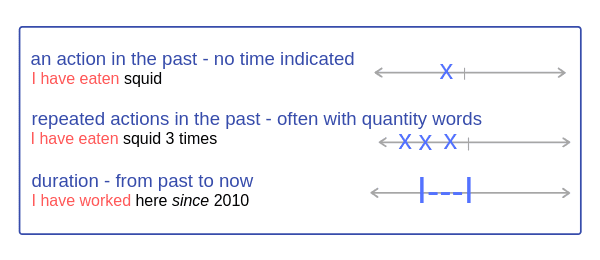ref –
- https://www.englishclub.com/grammar/verb-tenses_present-perfect.php
- https://www.espressoenglish.net/difference-between-present-perfect-and-past-perfect-in-english/
- https://www.natterandramble.co.uk/present-perfect-tense-timeline-form-uses/

Perfect in latin means ‘action that has been completed’.
Present Perfect is an action that started in the past and continues to the present:
I have lived in this city for six months.
An action that happened before now (unspecified time) and is complete:
I have been to Japan twice.
With Present Perfect, one thing happened before the other, but one thing happened in the past, the other happened in the present.
Whereas in Past Perfect, one thing happened before the other, and they BOTH happened in the past.
Subject + [have/has] + past participle
Present Perfect tense
There is always a connection with the past and with the present.
The present perfect tense is used to show an action that happened in the past that is directly related to the present, such as actions that are still continuing or that indicate a change over time.
Six situations to use Present (Perfect)
1 – Habit: An ongoing action that started in the past, and is repeated up to the present
examples
- The professor has [taught] here for two decades.
- I (First person singular) have [been] here for twenty minutes.
- She (third person singular) has [worked] in the bank for five years.
- We (First person plural) have [had] the same car for ten years.
- He (third person singular) has [worked] in New York for a long time.
- They have [played] piano for three years.
- I have [worked] here for two
- He has lived here for ten years.
If you want to use ‘since’, the common trait is that the time between the past and now tends to be months or years. But sometimes, we can use hours too:
- I (First person singular) have [been] here since 9 o’clock.
- Have you (Second person singular) [played] the piano since you were a child?
- You have worked here since you left school.
- He (third person singular) has [worked] in New York since he left school.
- John (third person singular) hasn’t (has not) [called] since February.
- I haven’t ridden a horse since I was nine.
- I haven’t been on holiday since last year.
- They have been at the hotel since for weeks.
2 – Experiences
The present perfect tense emphasizes the effects or consequences of the action.
He has [climbed] many mountains in the world.
I have [seen] an alien.
He has [lived] in Bangkok.
Have you [been] there?
We have never [eaten] caviar.
The scientists have [discovered] plant life on the moon.
3 – An action that was completed very recently, so recent that it’s directly connected to the present
If an action was only completed very recently, you can describe it with the present perfect tense.
Even though the action happened in the past, it was so recent that it’s directly connected to the present. These cases usually use adverbs like just or now to show that the action “just now”.
I should not eat anymore because I have just brushed my teeth.
We have finished practice now, so let’s go home.
I have just finished my soccer practice.
I’ve just finished soccer practice.
We have now finished eating and are looking at the dessert menu.
4 – A change over time
The present perfect tense is often used to emphasize a change that happened over an extended period of time.
My cousin has [grown so much] since I saw her two years ago.
Thanks to the many months of playing, I have [become an expert] at Wordle.
I have [bought a car].
John has [broken his leg].
Has [the price gone up]
The police have [arrested the killer]
5 – An uncompleted action that is expected to be finished (in the negative)
If an action started in the past but was not completed, you can describe it with the present perfect tense if it’s likely to be completed in the future. This situation uses the negative form to show that the action is still unfinished and often uses the adverb yet.
The jury has [not reached a verdict (yet)].
I have [not finished my paper], but it’s due in an hour!
6 – To add significance to a completed action
You can use the present perfect tense to make any past action sound more important. The present perfect tense is often used with great achievements or accomplishments, as well as dramatic or rare events. This makes it appropriate for newsworthy events or major life experiences.
Macbeth has [killed the king]. (king now dead)
I have [met the love of my life]! (still with that person)
Additional Notes
have – First, second, and third plural
has – third person singular
resent (and will probably continue into the future). This is a situation (not an action). We usually use for or since with this structure.
First, Second, third person plural have.
Third person use has.
Note on usage of have/has vs had:
As a main verb, use have/has for the present tense and had for the past tense.
Is the subject still doing it?
If we make clear how long or when the subject has been doing it, then its up to the current present. For example:
John has lived here for ten/few years.
In this situation John still lives there.